
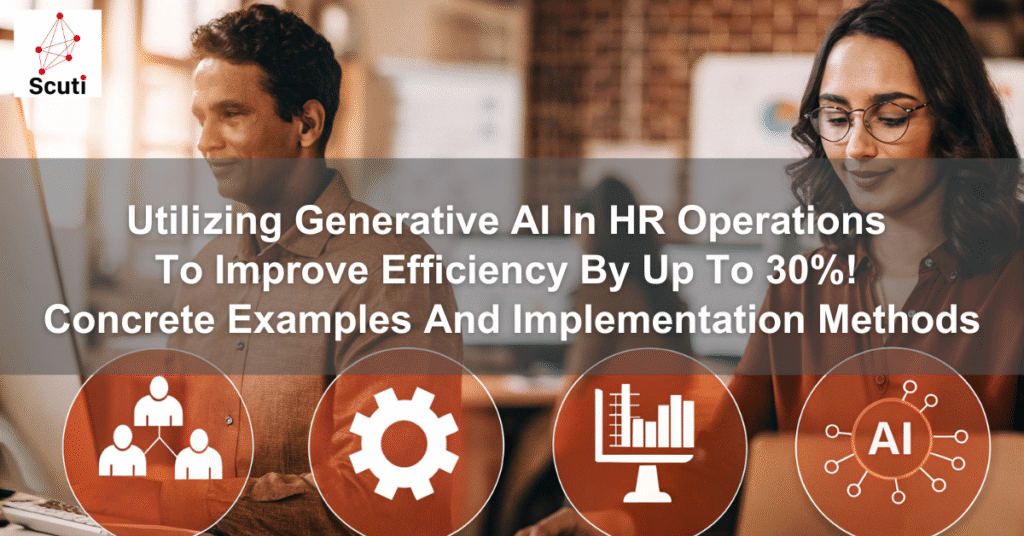
Hello, I am Kakeya, the representative of Scuti.
Our company specializes in services such as Offshore Development And Lab-type Development in Vietnam, as well as Generative AI Consulting. Recently, we have been fortunate to receive numerous requests for system development in collaboration with generative AI.
Generative AI is gaining attention in human resources! The HR department involves a wide range of tasks, and employees are often overwhelmed with daily responsibilities. However, by utilizing generative AI, these tasks can be streamlined, allowing for a more people-oriented way of working.
In fact, companies that have implemented generative AI have seen a reduction in recruitment costs by 20-25%, a 50% reduction in onboarding time, and an improvement in offer acceptance rates by 10-15%. While generative AI in HR may seem complex, there is no need to worry.
This article will clearly explain what generative AI in HR is, its benefits, and how to implement it. From basic knowledge to specific use cases and implementation steps, this article will cover everything, making you an expert in generative AI in HR!
Basic Knowledge of Generative AI in HR
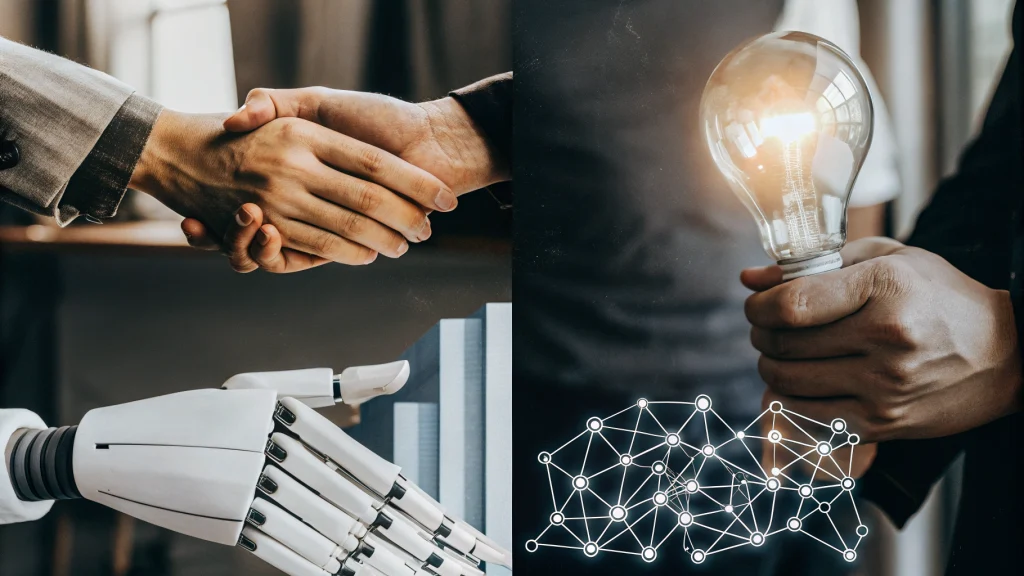
If you want to learn more about AI, be sure to check out this article first.
Related article: Comprehensive Guide To Implementing Generative AI: From Basic Knowledge To Practical Applications And Future Prospects
What is Generative AI?
Generative AI refers to artificial intelligence that can generate new content such as text, images, videos, and audio. It learns patterns from large amounts of data and creates new content based on these patterns. For example, a generative AI that has learned from a large number of images can create new images similar to the original ones.
Role of Generative AI in HR
Generative AI in HR can be applied to various tasks such as recruitment, employee development, and HR management. Specifically, it can be applied to the following tasks:
-
Content Creation: Creating job postings, drafting emails to candidates, drafting HR policies, creating training content, etc.
-
Data Analysis: Aggregating and analyzing performance evaluations, analyzing salary data, etc.
-
Communication: Improving employee engagement through AI chatbots, enhancing access to HR knowledge bases, recommending personalized learning based on skill gaps, etc.
-
Coding: Supporting HR analysis and planning through data collection and analysis, identifying patterns and correlations, etc.
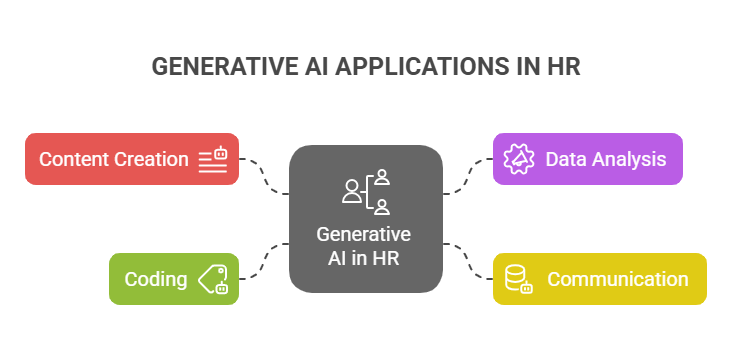
Mechanism of Generative AI
Generative AI functions by using neural networks that mimic the structure of the human brain. These neural networks learn from large datasets and recognize patterns. Based on the patterns they recognize, they generate new content.
Impact on the HR Department
Generative AI has the potential to significantly transform HR operations.
-
Increased Productivity: Generative AI can automate many tasks, potentially improving productivity by up to 30%.
-
Enhanced Employee Services: By providing tools like AI chatbots, employee experience can be enhanced. These chatbots have advanced language capabilities compared to traditional ones, enabling more intuitive and personalized responses.
-
Strengthened Strategic Role: As everyday tasks are automated by generative AI, HR professionals can focus on more complex and strategic responsibilities.
-
Shaping the Future of the Organization: HR departments can strengthen their role as strategic partners within organizations and take on a key role in shaping the future of the organization.
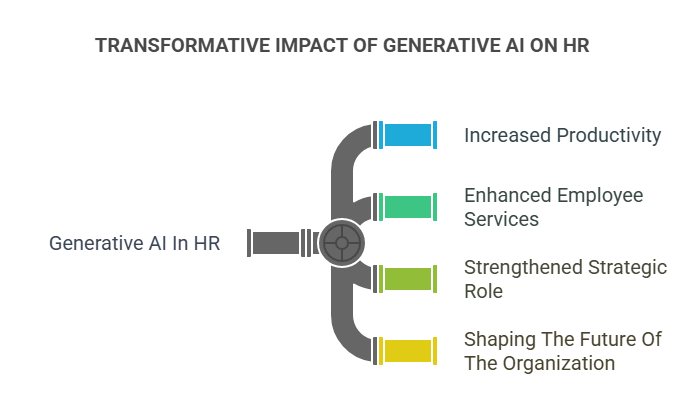
Specific Use Cases of Generative AI in HR
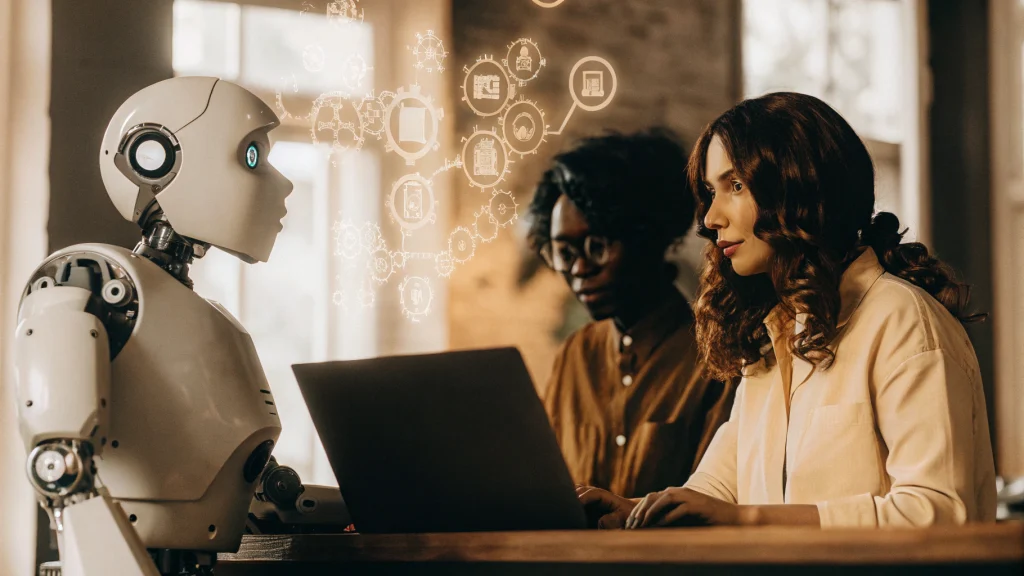
Recruitment and Employment
Generative AI tools such as ChatGPT are useful for creating accurate and engaging job postings and generating screening questions tailored to specific roles or candidate profiles. This allows for a more targeted and effective interview process. Additionally, by leveraging generative AI, various emails involved in the hiring process can be automatically generated.
For example, outreach emails and rejection notifications can be automatically drafted. Some talent intelligence platforms have generative AI features that allow searching databases through question formats instead of complex Boolean search strings, enabling the comparison and analysis of candidates’ job responsibilities and profiles. This allows recruiters to efficiently select candidates and quickly find the right talent.
Furthermore, generative AI can personalize communication with candidates throughout the recruitment process, providing a better candidate experience. This helps companies attract and retain top talent.
Onboarding
During onboarding, AI chatbots function as virtual onboarding assistants, providing real-time support to new hires. They can answer questions related to company policies, compensation and benefits, and vacation requests, improving the onboarding experience. This allows new employees to quickly adapt to the workplace and focus on their tasks.
Additionally, generative AI can automate the onboarding process, providing timely information and reducing new hires’ anxiety, facilitating a smooth transition. This helps companies prevent early turnover and foster long-term success.
Training and Skill Development
The combination of generative AI and HR supports employee growth and development. It analyzes employees’ skills, performance data, and career aspirations to suggest customized learning plans. AI-based coaching tools provide real-time feedback, aiding employees in improving their skills.
Moreover, generative AI updates training materials based on industry requirements, delivering the latest content and enabling employees to maintain up-to-date knowledge. This helps companies stay competitive and maximize employee potential. Training programs using generative AI can enhance employee engagement and improve overall organizational performance.
Employee Engagement
Generative AI can be used to brainstorm questions for employee engagement surveys and gather actionable insights to improve workplace satisfaction. AI chatbots handle routine inquiries from employees, allowing HR professionals to spend more time on higher-value face-to-face interactions.
Policy and Document Generation
Generative AI for HR is highly beneficial for creating and updating policies and documents. It speeds up the drafting of contracts and agreements, accurately generating documents based on company policies, significantly reducing administrative work for HR professionals.
HR Data Analysis
Generative AI analyzes large datasets to discover critical patterns and trends. It is useful for analyzing anonymized salary data, detecting anomalies in employee attendance data, and identifying potential issues early on, allowing for proactive solutions.
Internal Communication
Generative AI can quickly generate content tailored to organizational needs. It personalizes messages aligned with company values and fosters empathetic communication with employees.
Task Acceleration
When used effectively, generative AI allows HR professionals to complete many tasks quickly, enabling them to focus on more strategic activities such as employee development, talent management, and organizational planning.
HR Tips
If you want to deepen your knowledge of AI, consider investing in courses or training workshops that teach how to enhance HR productivity and business impact using generative AI tools such as ChatGPT.
The ChatGPT for HR online course from AIHR is a great example of a practical course that can be taken at your own pace.
Recommended Generative AI HR Tools
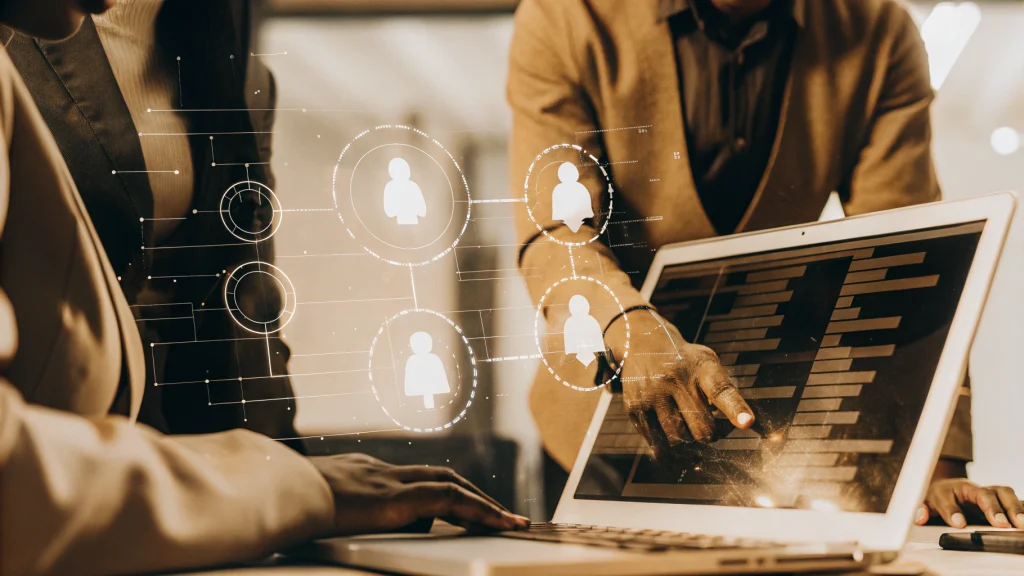
AI tools for HR are evolving daily. Here are 5 generative AI tools that are gaining attention.
| AI Tools | Applicable Areas | How They Help | |
|---|---|---|---|
| Benify | Total Rewards | Benify’s generative AI assistant “Beni” provides 24/7 personalized employee support, offering immediate responses to inquiries. | |
| Diversio | DEIB | Diversio’s generative AI identifies patterns in HR data and provides actionable recommendations to assess and improve a company’s diversity, equity, inclusion, and belonging (DEIB) efforts. | |
| ChatGPT | HR Efficiency and Productivity | As an advanced AI language model, it generates and streamlines communication, content creation, and problem-solving within the organization. | |
| Findem | Talent Acquisition and Recruitment | Findem’s AI assistant helps talent acquisition teams gain data-driven insights, supporting effective candidate search and email creation. | |
| Leena | Employee Experience | Leena is a virtual HR assistant that provides support throughout the employee lifecycle, automatically resolving inquiries related to onboarding, payroll, vacation, and more. |
Case Studies of Generative AI in HR Implementation
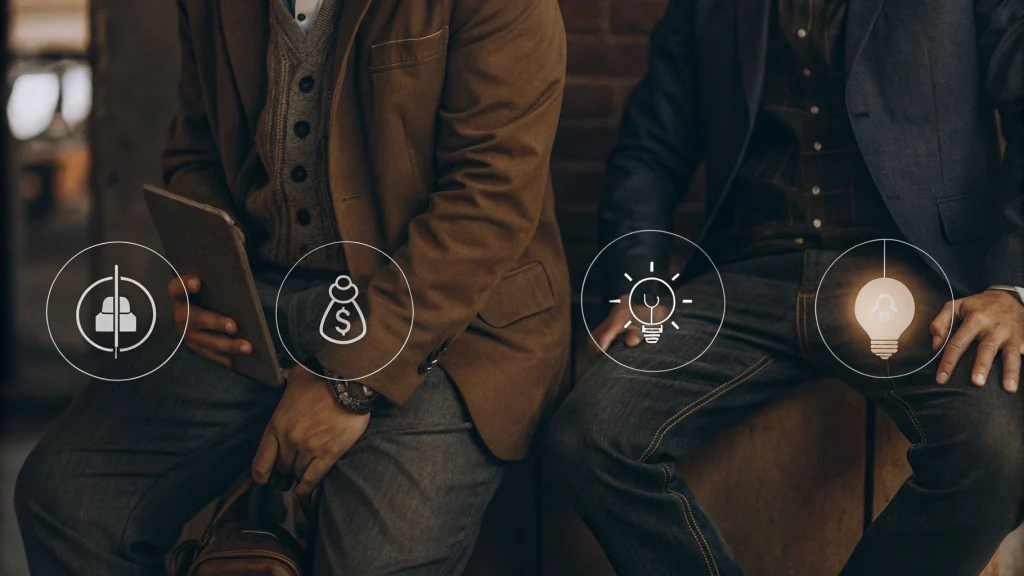
How Companies Are Using Generative AI in HR: Specific Implementation Examples
Case 1: Large Transportation and Logistics Company
A large logistics and service company struggled with the vast complexity of its HR policy documents. By implementing generative AI, they developed an HR policy document query assistant. This reduced HR-related inquiries by 30% and decreased compliance-related incidents by 20%.
Case 2: RingCentral
RingCentral, a cloud communication company, felt that traditional talent sourcing methods were insufficient for achieving recruitment goals. They implemented Findem’s generative AI solution, which resulted in a 40% increase in their talent pipeline and a 22% improvement in the quality of candidates.
Case 3: Manipal Health Enterprises
Manipal Health Enterprises, which needed to handle HR inquiries 24/7, implemented Leena AI. This reduced the HR team’s workload by over 60,000 hours and decreased new employee attrition by 5%.
Case 4: Straits Interactive
Straits Interactive, a data governance solutions company, used generative AI to develop an AI-driven data protection officer assistant. This allowed them to provide 24/7 responses to legal inquiries related to data protection and compliance.
Case 5: Heluna Health
Heluna Health implemented CloudApper’s hrGPT, improving communication with their dispersed workforce. This enhanced employee engagement and improved consistency of information through the automation of HR tasks.
How to Implement Generative AI in HR

Best Practices for Implementing Generative AI in HR
Step 1: Start Small and Experiment
Begin by testing free tools like ChatGPT to get familiar with the basic functionalities of generative AI. For example, use it for creating employee survey questions or brainstorming interview questions.
Step 2: Learn How to Create Effective Prompts
To use generative AI effectively, it’s important to create high-quality prompts. Be clear about the purpose, context, and format of your request. Through trial and error, refine your prompts to find the best results.
Step 3: Evaluate and Improve Based on AI Output
Always review the outputs generated by AI and evaluate the effectiveness of the queries. Check the accuracy and relevance of the content, and improve the prompts as needed.
Step 4: Gradually Integrate AI
Instead of introducing AI into everything at once, gradually incorporate it into your workflow. For example, start by using AI for policy document creation, and later extend it to data analysis.
Step 5: Always Mind Data Privacy
When using generative AI, make sure to prioritize data privacy. Be particularly cautious with confidential information and comply with data protection regulations.
Step 6: Collaborate with IT
Work with your IT team to understand the technical aspects of generative AI tools. This will ensure smooth integration with existing HR software and help minimize technical issues.
Summary
Generative AI continues to evolve and plays a significant role in improving HR efficiency and enhancing employee experience. By implementing generative AI tools in HR processes, teams can reduce their workload and focus on more strategic tasks. Properly leveraging generative AI will help future-proof HR departments.
The Future of Generative AI in HR

Generative AI in HR enhances the efficiency of HR operations and improves the employee experience, strengthening its role as a strategic partner within the organization. By implementing generative AI, HR departments can focus more on human-centered and strategic tasks, thereby increasing the overall value of the organization.
